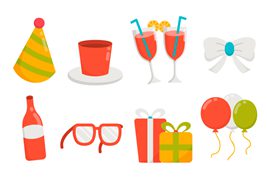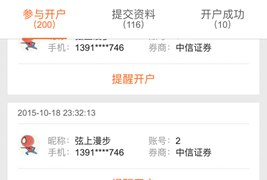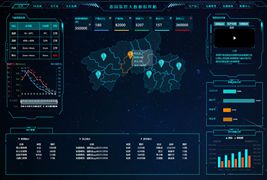四种方式快速实现上拉触底加载效果
在智能小程序的开发过程中,上拉加载是一种十分常见的加载效果,最近也收到了一些开发者在开发上拉加载时遇到的问题,今天的内容就为您介绍一下如果想实现上拉加载,我们需要如何去做。
以下是为大家总结的四种常见的实现方式:
使用 onReachBottom 实现
使用 scroll-view 组件实现
使用信息流模板实现上拉加载
使用 swiper 组件配合 onReachBottom 实现上拉加载
使用 onReachBottom 实现
智能小程序提供了onReachBottom,即页面上拉触底事件的处理函数。可以拿在 Page 中定义 onReachBottom 处理函数,监听该页面用户上拉触底事件,从而实现上拉加载。
为方便大家直接使用看到效果,将下述代码片段,直接导入开发者工具中运行查看即可: swanide://fragment/7e944c0c3785bbdf4437c672dd0dc8e41584413934361
代码解析
1、swan 文件是每个智能小程序页面的展现模板,类似于 Web 开发中的 HTML,所以我们先在 swan 文件中设置商品的展现样式:
- <view class="goodsList">
- <block s-for="item,index in goods">
- <view class="goodsItem">
- <view class="goodsImage">
- <image src="{{item.img}}"></image>
- </view>
- <view class="goodsTitle">
- <text>{{item.title}}</text>
- </view>
- </view>
- </block>
- </view>
- <view class="loading">努力加载中...</view>
2、在 js 文件中使用onReachBottom事件,当页面滑动到页面底部时,请求下一页展示数据,即实现上拉加载的效果。
- ...
- ...
- onReachBottom() {
- //触底时继续请求下一页展示的数据
- this.initData();
- }
使用 scroll-view 组件实现
利用 scroll-view 组件实现上拉加载也是一种十分常见的方法,实现步骤与使用onReachBottom事件类似。
scroll-view是百度智能小程序提供的组件,可实现试图区域的横向滚动和竖向滚动。使用它的bindscrolltolower属性,当页面滚动到底部或右边的时候,则会触发scrolltolower事件,从而实现上拉加载的效果。
为方便大家直接使用看到效果,将下述代码片段,直接导入开发者工具中运行查看即可: swanide://fragment/fccd71b098a7d3921b9958ccd9dba1071584414516291
代码解析
在 swan 文件中使用 scroll-view 组件,设置商品的展现样式。当页面滑动至底部时,触发scrolltolower事件,实现试图区域的竖向滚动。
- ```
- <view class="intro">
- <scroll-view
- class="scrollview"
- scroll-y
- bindscrolltolower="scrolltolower"
- >
- <view class="goodsList">
- <view s-for="item,index in goods">
- <view class="goodsItem">
- <view class="goodsImage">
- <image src="{{item.img}}"></image>
- </view>
- <view class="goodsTitle">
- <text>{{item.title}}</text>
- </view>
- </view>
- </view>
- </view>
- <view class="loading">努力加载中...</view>
- </scroll-view>
- </view>
- ```
使用信息流模板实现上拉加载
信息流模版是百度智能小程序提供的组件,可配置上拉刷新、列表加载、上拉加载功能,适用于列表信息展示,并可放置在页面的任何部分。
与其它组件功能不同,使用信息流模板时需执行下述命令行,引入页面模板。
- npm i @smt-ui-template/page-feed
并在进入page-feed文件夹后,执行下述命令行安装所有模板依赖。
- npm i
为方便大家直接使用看到效果,将下述代码片段,直接导入开发者工具中运行查看即可: swanide://fragment/71af2b7f470b29b13f792c417fc5f03c1588757790402
代码解析
1、在 swan 文件中使用信息流模板,通过 smt-spin 组件加载更多数据。
- <smt-feed class="smt-feed pull-down-refresh" pull-to-refresh bind:scrolltolower="scrollToLower" text="{{text}}" style="height: 100vh">
- <!-- 信息流组件作为局部滚动组件,必须在它的父级或本身指定高度 -->
- <view class="goodsList">
- <view s-for="item,index in goods">
- <view class="goodsItem">
- <view class="goodsImage">
- <image src="{{item.img}}"></image>
- </view>
- <view class="goodsTitle">
- <text>{{item.title}}</text>
- </view>
- </view>
- </view>
- </view>
- <smt-spin status="{{status}}" bind:tap="reload"></smt-spin>
- </smt-feed>
2、在js文件中,利用在smt-spin组件上绑定的事件,实现加载更多的数据。
- ...
- ...
- async scrollToLower() {
- const goods = await this.initData();
- await syncSetData(this, {
- goods: goods.concat(this.data.goods || [])
- });
- },
- ...
- ...
使用 swiper 组件配合 onReachBottom 实现上拉加载
使用 swiper 组件配合 onReachBottom 的实现方法也比较常见,相较上边两种实现方式有些复杂,但同时也可以实现更加复杂的上拉加载场景。
swiper 组件是智能小程序提供的滑块视图组件,与 swiper-item 组件配合使用,可实现 swiper 组件内 swiper-item 的滑动。需要动态设置 swiper 组件的高度,来保证每次滑动到底时都能触发 onReachBottom 。
为方便大家直接使用看到效果,将下述代码片段,直接导入开发者工具中运行查看即可: swanide://fragment/20e8fd8c561418df7c4f24a850bf43461585224391100
代码解析
1、根据实际场景需要在 swan 文件中设置 tab,当设置多个tab时,实现效果如下:
- <view class="swiper-tab">
- <view class="tab-item {{currentTab==0 ? 'on' : ''}}" data-current="0" bindtap="swiperNav">Tab1</view>
- <view class="tab-item {{currentTab==1 ? 'on' : ''}}" data-current="1" bindtap="swiperNav">Tab2</view>
- </view>
2、在 swan 文件中使用 swiper、swiper-item 组件。
- <swiper class="swiper" style="height: {{swiperH}}" current="{{currentTab}}" bindchange="swiperChange">
- <swiper-item class="item">
- <view class="goodsList">
- <view s-for="item,index in goods">
- <view class="goodsItem">
- <view class="goodsImage">
- <image bindload="imageLoad" src="{{item.img}}"></image>
- </view>
- <view class="goodsTitle">
- <text>{{item.title}}</text>
- </view>
- </view>
- </view>
- </view>
- <view class="loading">努力加载中...</view>
- </swiper-item>
- <swiper-item class="item">
- <view class="goodsList">
- <view s-for="item,index in goods">
- <view class="goodsItem">
- <view class="goodsImage">
- <image src="{{item.img}}"></image>
- </view>
- <view class="goodsTitle">
- <text>{{item.title}}</text>
- </view>
- </view>
- </view>
- </view>
- <view class="loading">努力加载中...</view>
- </swiper-item>
- </swiper>
3、在 js 文件中设置 swiper 组件的高度。
- // 给image添加load事件,保证图片全部加载出来再计算swiper-item的高度并赋值给swiper
- imageLoad() {
- let len = this.data.goods.length;
- this.setData({
- imgLoadNum: ++ this.data.imgLoadNum
- })
- if(this.data.imgLoadNum === len){
- this.queryNodeInfo();
- }
- },
- // 设置swiper的高度,如果不动态设置swiper的高度,当页面滑动到底部时,不会触发onReachBottom
- queryNodeInfo: function(){
- let currentTab = this.data.currentTab;
- swan.createSelectorQuery().selectAll('.item').boundingClientRect((rect) => {
- this.setData({
- swiperH: rect[currentTab].height + 'px'
- })
- }).exec();
- }
4、在 js 文件中使用onReachBottom事件,当页面滑动到页面底部时,请求下一页展示数据,即实现上拉加载的效果。
- onReachBottom() {
- this.initData();
- },
总结
使用方法 1、2、3 可快速实现简单页面的上拉加载;而使用方法 4 可实现页面中存在多个 tab 的场景,比如:最新、最热列表的切换。开发者可根据实际情况选择不同的实现方法。
作者:小花 ,github链接:https://github.com/mengbodi/swan/issues/1
本文网址:https://www.zztuku.com/index.php/detail-7951.html
站长图库 - 四种方式快速实现上拉触底加载效果
申明:如有侵犯,请 联系我们 删除。
















您还没有登录,请 登录 后发表评论!
提示:请勿发布广告垃圾评论,否则封号处理!!